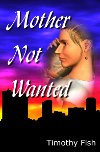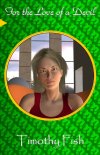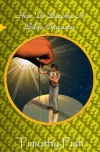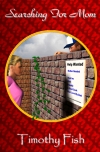
And Thy House
Extra Feature: High Res Image

History of
Cane Creek
Association
by D. F. Magruder
Aiming for Creativity and Brilliance
Written By: Timothy Fish Published: 11/15/2007
In a recent interview on Chip MacGregorís Blog, Steve Laube stated ďSo my advice is to stop chasing the marketÖ. Take your writing to a level that causes agents and editors to gasp at its creativity and brilliance.Ē That sounds like good advice and since Steve Laube is an agent, I am sure that exactly what he would like to see, but how does an author recognize his own level of creativity and brilliance? Can an author stick a thermostat under the tongue, under the arm or somewhere else to measure the creativity and brilliance of a manuscript? Perhaps he can lay his manuscript next to another authorís book and compare the creativity of one versus the other. Sadly, it doesnít work that way. It is difficult for an author to objectively look at his work and recognize level of creativity and brilliance in the piece. Without that ability an author has no hope of dazzling editors and agents.
Measuring Creativity
The very thought of trying to measure creativity is ridiculous. If we could understand it well enough to measure it then it is no longer creative, but there is a measuring stick that an author can use to judge the creativity of the manuscript. The author must compare his work to the authorís view or the world. The closer it is to his view, the more creative it is.
What is Creativity
A lot of people hurt themselves trying to be creative. ďIím not creative,Ē people often say. Books have been written about how to be more creative, how to think outside the box. Some authorís complain of suffering from writerís block, which appears to be what people get when they try to hard to be creative. People are trying hard to be creative, but what is creativity?
Creativity is the ability to create something new. In writing books, creativity means that the reader will read the book and think Iíve never seen that before or I didnít see that coming. When the readers are editors and agents, who read many, many books, the goal of creativity seems much more illusive. They have seen every possible plot. They have seen hundreds of variations on those plots. What can an author show them that they have not seen? The answer is, himself.
Creativity is not about mimicking the work of creative authors. Creativity is about putting oneís unique work out there for the world to see. The thing that is unique to an author is his view of the world. No one else looks at the world the way he does. That is what creativity is.
A Little Offbeat
A creative author focuses on his slightly offbeat view of the world. We walk the journey of life and we often find that we are in agreement with other people about many things, but all of us are unique in some way. It may be one thing or a combination of things that makes us unique, but we are unique. Because of that, we see some things in a slightly different way than the rest of the world. That is where our creativity lies. When we stay true to our offbeat view of the world then we are our most creative.
The Problem with Creativity
Creativity alone will not impress people. An author can write a very creative piece and people will look at it and say, thatís stupid. Because the author has a different opinion about a subject, or how to present that subject, there will be people who disagree with his opinion, his writing style, his choice of words or anything else that might go into creating the work. That is a risk that an author must take, but it is a risk that some authorís try to avoid.
Letís say that like Yoda, a writer wants to write. Like this paragraph it might be. ďStupid, it is,Ē will say the critics. ďThinking he was not.Ē Creative is it, but not readable is it.
Rather than risk rejection because people donít like an authorís ideas or approach, some authors ignore their own creativity and try to write like a popular author. While there is good to learn from the success of others, mimicking others is the direct opposite of creativity. An author should not try to reinvent the wheel each time, but editor and agents complain about seeing manuscripts that are essentially a repackaging so some bestseller. An author might like Lord of the Rings so he writes a story about someone who goes on a quest to destroy something, making his way through many hardships and creatures more powerful than he is. The author is thinking that people will buy it because it is similar to something that they are buying. The editor is thinking that he has seen hundreds of similar manuscripts.
Creativity may cause an author to create something that other will not like, but that same creativity will make the author stand out as being different. An author who is true to himself is creative, but he needs more than that. He needs brilliance.
Measuring Brilliance
An author measuring his own brilliance is about like two children trying to determine who is taller. A child will place his hand at his forehead and swing it forward to see where it hits another child. Invariably, the childís hand will go up or down a few inches as he does this. As a author tries to compare his work to that of others, he may determine that he has done a better job of writing or a worse job, but it is hard to know how accurate his assessment it. It is a difficult assessment to make and yet an author must have a way to judge his brilliance as he is writing if he hopes to impress others. Rather than focusing on how his work compares to others, an author needs something that he can measure accurately.
Would I Want to Read This?
Writing is hard, so an author will eventually grow tired of a manuscript, but one way for an author to judge the brilliance of his work is to ask himself if this is something that he would like to read again. Is this book something that he would like to pick up and read a year from now? When reading novels, I judge how much I like the book by my desire to read the story again. If the author of a book is not willing to read a novel again then it is unlikely that readers will enjoy it that much either. An author should write what he wants to read. If the author reaches the end of revising the book several times and still looks forward to the day when he can sit down and read it for the enjoyment of the story that is an indication of brilliance. If he puts it aside and say, ďI never want to see it againĒ then it is not great.
Does it Move Me?
The brilliance of a manuscript is often tied to how emotional it is, but it is difficult to guess how a reader will take a particular passage. Will the reader think it is funny? Will the reader think it is sad? Will the reader hate the villain? Will the reader cheer for the hero? If that doesnít happen then the manuscript isnít brilliant. How can an author know how a reader will react? He canít, but the author knows how he reacts when he reads the passage.
An author has to read his work many times. If the author comes to a passage that he has written and laughs out loud, there is a strong possibility that the reader will find is funny also. If an author gets to a passage and it brings him to tears, there is a strong possibility that it will do the same for the reader. His own writing should move the author. The more deeply an author is moved by his writing, the more likely it will impress others.
Am I Communicating Well?
One problem is that authors will be moved by the story, but they will fail to communicate that emotion to the reader. This is where skill comes into play. This is why authors are encouraged to practice their craft. An author knows the ground truth of the story and this is often very different from what he is able to communicate to the reader. There is a balance that must be achieved. The author cannot describe all of the details or the reader will get bored. It is even helpful to allow the reader to draw images from his own imagination, but the author must also provide enough information that the reader has similar thoughts and emotions. If the author fails to reach the proper balance, the reader will only smile a little or even be offended at some of the authorís jokes. Instead of feeling sorry for a character, the reader may be cheering for the villain, hoping that he will kill of the other character.
Taking time away from the story can be helpful for an author. We are forgetful, so when we come back to the story we have to read it to be reminded about what is happening. It is then that an author is able to determine how well he is communicating his vision to the reader.
Conclusion
Dazzling an editor or agent with creativity and brilliance is often a matter of opinion, but it is an impossible target to hit without a way to aim. By staying true to oneís self and writing in such a way that the author enjoys his own writing, improving his skill as needed, the author has something to aim for.
www.timothyfish.com



